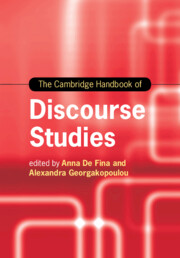Book contents
- The Cambridge Handbook of Discourse Studies
- Cambridge Handbooks in Language and Linguistics
- The Cambridge Handbook of Discourse Studies
- Copyright page
- Contents
- Figures
- Tables
- Contributors
- Preface
- Part I (Con)Textualizing Discourses
- Part II Perspectives and Modes of Analysis
- Part III Discourse Materialities and Embodiment
- Part IV (Trans)Locations and Intersections
- Part V Ethics, Inequality and Inclusion
- 21 Ethics and the Study of Discourse
- 22 Migrants, Citizenship and Language Rights
- 23 Diversity and Inclusion in Education
- 24 Discourse and Racialization
- 25 Discourse and Narrative in Legal Settings: The Political Asylum Process
- 26 Discourse and Religion in Educational Practice
- Part VI Discourses, Publics and Mediatization
- Index
- References
22 - Migrants, Citizenship and Language Rights
from Part V - Ethics, Inequality and Inclusion
Published online by Cambridge University Press: 28 September 2020
- The Cambridge Handbook of Discourse Studies
- Cambridge Handbooks in Language and Linguistics
- The Cambridge Handbook of Discourse Studies
- Copyright page
- Contents
- Figures
- Tables
- Contributors
- Preface
- Part I (Con)Textualizing Discourses
- Part II Perspectives and Modes of Analysis
- Part III Discourse Materialities and Embodiment
- Part IV (Trans)Locations and Intersections
- Part V Ethics, Inequality and Inclusion
- 21 Ethics and the Study of Discourse
- 22 Migrants, Citizenship and Language Rights
- 23 Diversity and Inclusion in Education
- 24 Discourse and Racialization
- 25 Discourse and Narrative in Legal Settings: The Political Asylum Process
- 26 Discourse and Religion in Educational Practice
- Part VI Discourses, Publics and Mediatization
- Index
- References
Summary
The notion of language rights has proven to be highly controversial. It has typically been invoked in calls for the state to protect and recognize the heritage languages of minority communities. Implicit in such calls is a reliance on traditional understandings of what it means to be a member of a language community, to be a speaker of that community’s affiliated language, and to be a citizen of the state within which the community is embedded. But the conceptions of citizenship as well as those of community and language are changing – often in response to global shifts in mobility and migration. And these changes exacerbate rather than mitigate the problematic nature of language rights. In this chapter, I review various studies of citizenship, mobility, migration and language rights. Among the points that I make are the following: A fuller appreciation of implications of these changes needs to take into account the impact of neoliberalist ideologies. Recent developments such as the gig economy and virtual migration also need to be factored in. Underlying all these is the idea of personhood and how it variously informs the understanding of what it means to be a migrant, a citizen and a speaker of a language. I then flesh out the theoretical and policy implications of these studies, arguing that there is need to move beyond language rights if the migrant-citizen-language nexus is to be properly understood and fruitfully addressed.
Keywords
- Type
- Chapter
- Information
- The Cambridge Handbook of Discourse Studies , pp. 487 - 504Publisher: Cambridge University PressPrint publication year: 2020
References
Further Reading
This book addresses the complex question of how inclusivity and diversity can be fostered in a democracy. It proposes a model of public deliberation based on the public reasoning and discussions of citizens so as to encourage cooperation amidst increased social complexity.
This volume elaborates on the notion of linguistic citizenship, presenting studies from the global South. It shows how addressing speakers’ vulnerability and need to exercise agency requires first deconstructing ideas of what language is.
This volume highlights the importance of approaching the language–citizenship nexus from a multivocal, multimodal and semiotic perspective. Drawn from a variety of case studies, it shows how conflicting notions of citizenship can be understood only if institutional discourses are combined with more ethnographic data.



